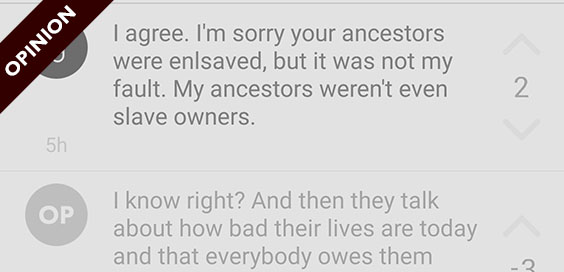On Oct. 8, as UnLearn Week was coming to an end, someone posted on the anonymous social media app Yik Yak, “How many people here hate it when the black people here make white people feel bad for being white and then proceed to tell the white people that black people’s live[s] are so much harder? Just curious.” This Yak was followed by 40 comments (a rarity on Yik Yak), most expressing a too-common ignorance about American history — comments like “My ancestors weren’t even slave owners” or that folks “make everything a race issue” or “Many slaveowners actually cared for their slaves too …” Shortly after seeing these posts I (Jonas) took screenshots and posted them on Facebook.
Alone, these comments demonstrate simple ignorance, a lack of engagement with UnLearn Week and a lack of engagement with the Calvin community, an explicitly Christian one centered on justice. These Yaks demonstrate something more difficult to stomach — that we have failed to see education as a movement toward justice, which means we’ve failed to see how UnLearn Week helps with the cultivation of justice. Despite the best efforts of the campus and the administration, somewhere along the line there’s been a disconnect — a disconnect where unlearning prejudices equals being attacked. Somewhere, being uncomfortable was seen as an attack. The goal of UnLearn Week is not to attack white people. The goal of UnLearn Week is to start a dialogue on campus — an extremely important one at that — a dialogue that needs to be held all around the world for the sake of the well-being of humans.
UnLearn Week is not a time to attack people, but to encourage them. Encouraging people to engage other cultures and learn about the discrimination and prejudices that are held against these cultures. It encourages people to look past the free food that is provided at the events and indulge in the cultural sustenance being provided in dialogue. UnLearn Week encourages people to empathize with panelists who have experienced racism firsthand, who have felt hatred due to the uncontrollable color of their skin or the culture that they were raised in. Encouraging them to look past their neighborhoods, schools and friends. To unlearn the stereotypes they’ve grown up with. It encourages you to immerse yourself in other cultures and learn about other people’s experience of living in America with a different color of skin.
But the reality is that these Yaks fundamentally compromise the nature of what Calvin, as a Christian community, is committed to — a commitment we as students all signed on to. It’s a commitment to diversity — but not just diversity. The more radical commitment is to inclusion. Increasing the number of AHANA students or international students is not equal to inclusion. Inclusion is hard and these Yik Yak comments ultimately harm progress toward being a multicultural, inclusive community where people are safe and are not excluded. Inclusion is intentional and hard and requires a total shift in how we view the world. This is why these Yaks are harmful, because they demonstrate a refusal to engage a new way of seeing the world.
What’s to be done? Go to UnLearn Week with a smile and a skip? Go to all the MSDO events with a jolly grin? Try to be nicer? Pray a bit more for peace? Encourage peace? No. Too easy. That demands nothing. Instead, cultivate the friendships you have with one another. Really, seriously take a posture of listening. Don’t just hear one another, listen. Put your questions on the backburner. Empathize deeply with people. More than that, though, realize that conversations about racism and race are fundamentally uncomfortable conversations. But discomfort is what a school should cause in the best possible way. You grow by encountering difficult-to-swallow stories that change your perception of how the world actually is. This is what inclusion is, in part: giving people space to tell their stories and to be truly heard.
If you would like to continue this conversation and meet or arrange a safe space to have honest, raw discussion, feel free to email me and we can try to get this rolling. My email is jrw42@students.calvin.edu.



